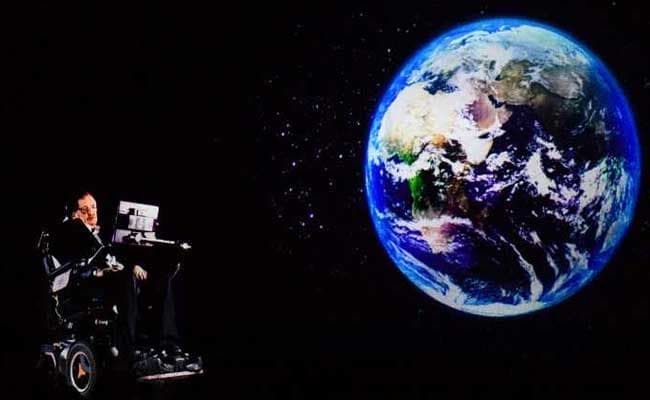'I'm Not Afraid': What Stephen Hawking Said About God, His Atheism And His Own Death
Stephen Hawking said during an interview with El Mundo in 2014: "Before we understand science, it is natural to believe that God created the universe.
World | (c) 2018 The Washington Post | Lori Johnston, The Washington Post | Updated: March 17, 2018 06:28 IST

Stephen Hawking died at his home in Cambridge in England on 14th March.
He said during an interview with El Mundo in 2014: "Before we understand science, it is natural to believe that God created the universe. But now science offers a more convincing explanation. What I meant by 'we would know the mind of God' is, we would know everything that God would know, if there were a God, which there isn't. I'm an atheist."
That followed comments made to Reuters in 2007 in which Hawking, who had lived with amyotrophic lateral sclerosis (also known as Lou Gehrig's disease or ALS) since 1963, described himself as "not religious in the normal sense."
"I believe the universe is governed by the laws of science," he said. "The laws may have been decreed by God, but God does not intervene to break the laws."
Because of his involvement in the Pontifical Academy of Sciences, which fosters "interaction between faith and reason and encouraging dialogue between science and spiritual, cultural, philosophical and religious values," he visited the Vatican over the years. Hawking gave a talk on "The Origin of the Universe" during the group's 2016 conference at the Vatican.
During those visits, he met with religious leaders, includingPope Francis andPope Benedict XVI. In his comments to the Academy in 2010, Benedict XVI seemed to refer to Hawking,saying, "Scientists do not create the world; they learn about it and attempt to imitate it."
In Hawking's writings about the universe's origin, he and co-author Leonard Mlodinow posited in the 2010 book, "The Grand Design," that the big bang was inevitable.
"Because there is a law such as gravity, the universe can and will create itself from nothing," the book states. "Spontaneous creation is the reason there is something rather than nothing, why the universe exists, why we exist. It is not necessary to invoke God to light the blue touch paper and set the universe going."
In discussing the book, he toldABC News: "One can't prove that God doesn't exist. But science makes God unnecessary. . . . The laws of physics can explain the universe without the need for a creator."
Hawking's earlier best-selling cosmology book, "A Brief History of Time," also discussed black holes and the big bang. The 1988 book offered his "theory of everything" that understanding the universe offers a glimpse of "the mind of God."
He also explained throughout his life his thoughts on a possible afterlife,saying, "I believe the simplest explanation is, there is no God. No one created the universe and no one directs our fate. This leads me to a profound realization that there probably is no heaven and no afterlife either. We have this one life to appreciate the grand design of the universe and for that, I am extremely grateful."
In 2011, his comments to the Guardian explained his stance further: "There is no heaven or afterlife for broken down computers; that is a fairy story for people afraid of the dark."
Hawking, who was born Jan. 8, 1942, and lived with his disease for much longer than expected, also said during the interview: "I'm not afraid of death, but I'm in no hurry to die. I have so much I want to do first."
(This story has not been edited by NDTV staff and is auto-generated from a syndicated feed.)
Brilliant scientist but LACKS IN common sense
British physicist, cosmologist, astronomer, theoretician and writer.
Common sense - Wikipedia
https://en.wikipedia.org/wiki/Common_sense
Common sense is sound practical judgment concerning everyday matters, or a basic ability to perceive, understand, and judge that is shared by ("common to") nearly all people.[1] The first type of common sense, good sense, can be described as "the knack for seeing things as they are, and doing things as they ought to be done."

......................................................................
LACKS IN-The second type is sometimes described as folk wisdom, "signifying unreflective knowledge not reliant on specialized training or deliberative thought." The two types are intertwined, as the person who has common sense is in touch with common-sense ideas, which emerge from the lived experiences of those commonsensical enough to perceive them.[2]


John Carson Lennox is a Northern Irish mathematician specialising in group theory, philosopher of science and Christian apologist. Wikipedia
Born: 7 November 1943 (age 74), Northern Ireland, United Kingdom
Doctoral students: Howard Smith
Professor John Lennox | God DOES exist - YouTube
https://www.youtube.com/watch?v=otrqzITuSqE
Dec 21, 2012 - Uploaded by OxfordUnion
Professor John Lennox gives his argument for the existence of God. SUBSCRIBE for more speakers ▻ http://is ...



